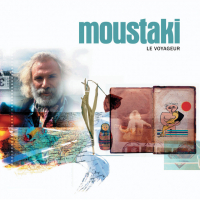Georges Moustaki
 EGYMiddle Eastern, Arabic Folk, French Folk
EGYMiddle Eastern, Arabic Folk, French Folk

 EGYMiddle Eastern, Arabic Folk, French Folk
EGYMiddle Eastern, Arabic Folk, French FolkMiddle Eastern musician Georges Moustaki was born in Alexandria, Egypt. He is regarded as a founder of Arabic folk music, which fuses modern elements with melodies and instruments from the Middle East. The expressive characteristics of Moustaki's music are well known, and his lyrics frequently deal with themes of love, sorrow, and the human condition.
Moustaki's music, which draws inspiration from both Arabic and European music, is a reflection of his cultural roots. His distinctive sound combines contemporary instruments like the guitar and piano with the classic tones of the oud, qanun, and darbuka. With his deep voice and sophisticated melodies, Moustaki's music has a fascinating appeal that draws listeners in and takes them to another time and place.
Moustaki has always stayed faithful to his roots, making music that captures the spirit and essence of Middle Eastern culture. His enormous contribution to Arabic folk music has encouraged generations of musicians to learn more about its rich traditions and history. His music is still appreciated and loved by listeners today, which speaks to his lasting reputation as a true master of the genre.
Famous Middle Eastern and Arabic folk musician Georges Moustaki was born in Alexandria, Egypt. His most well-known songs include "Le meteque - Remastered", "Les Eaux de Mars", "Ma solitude - Remastered", "Votre fille a 20 ans", and "Ma liberte - Remastered".
Le meteque, one of his best-loved songs, portrays the tale of a guy who, because of his cultural heritage, is undervalued and misunderstood. The song has become a classic in the Middle Eastern music scene thanks to its catchy tune and accessible lyrics. "Sans la nommer," which showcases Moustaki's distinctive raspy vocals and soulful guitar playing, is another fan favorite.
Music by Moustaki frequently addressed issues like love, loss, and the human condition. He has a devoted following all around the world because to his poetic lyrics and distinctive musical style. Other noteworthy songs include "Le facteur," "La ligne droite," and "Le temps de vivre - Bande originale du film "Le temps de vivre."
It is impossible to overestimate Georges Moustaki's contribution to Arabic and Middle Eastern folk music. Fans are still moved and moved by his music today, demonstrating the enduring power of his genius.
The well-known Alexandria, Egypt-born singer-songwriter Georges Moustaki has recently put out a number of albums and songs. 'Raretes & inedits, Vol. 2' and 'Raretes & inedits, Vol. 1' were his most recent albums, while 'L'album de sa vie' was also released in 2023. These albums exhibit his distinct style and talent with a selection of his iconic tunes and newly unreleased pieces.
In terms of his most recent singles, Georges Moustaki debuted 'Il est trop tard' in 2013, a lovely ballad that highlights his soulful voice and poetic words. Les Meres Juives, a heartfelt ode to his mother and other Jewish moms, was released twice: once in 2006 and once in 2005. His 2004 song "Odeon" is a hauntingly lovely example of his musical brilliance.
Georges Moustaki has developed a reputation for being able to combine Middle Eastern and Western elements to produce a sound of his own throughout his career. His passionate voice, literary words, and gorgeous melodies that linger in your head long after the song has ended define his music. One of the best Arabic folk musicians of all time, his most recent albums and singles further demonstrate his skill.
Middle Eastern and Arabic folk artist Georges Moustaki, who is from Alexandria, Egypt, has played at a range of events and festivals during the course of his career. At the prestigious Le Theatre de l'Atelier in Paris, he gave one of his most illustrious performances.
A unique combination of Middle Eastern and Western music was featured in Moustaki's performance at Le Theatre de l'Atelier, which received high appreciation. His passionate vocals, complemented by traditional instruments like the oud and the darbuka, mesmerized the audience.
Moustaki performed at a number of prestigious locations in addition to Le Theatre de l'Atelier, including the Olympia in Paris and the Royal Albert Hall in London. Additionally, he performed at events including the French Festival des Vieilles Charrues and the Montreux Jazz Festival.
In general, Moustaki's performances were renowned for their emotional content and inward contemplation. His live performances were a genuine tribute to his talent as a musician and singer, and his songs frequently explored themes of love and loss.
The Alexandria, Egypt-born Middle Eastern musician Georges Moustaki has worked with a number of other musicians during the course of his career. The songs "Votre fille a 20 ans" by Vincent Delerm, "La ligne droite" and "La dame brune" by Barbara, "Watashi no Kodoku" by Pink Martini, and "Marmara (feat. Georges Moustaki)" by Marina Rossell are just a few examples of notable collaborations.
The work on "La dame brune" with Barbara was one of the most significant. The song, titled "The Brown Lady," combines Barbara's strong vocals and Moustaki's delicate guitar playing. The song's lyrics describe a mystery woman who seizes everyone's attention. This band's cooperation is a remarkable one thanks to the eerie tune and moving lyrics.
The song "Watashi no Kodoku" by Pink Martini is another noteworthy collaboration. Pink Martini's distinctive global music fusion and Moustaki's vocals are featured in the song, which is titled "My Solitude" in Japanese. The outcome is a stunning and depressing song that highlights Moustaki's range of emotional expression.
In conclusion, Georges Moustaki worked with a number of gifted musicians to produce some of the most enduring tunes in Arabic and Middle Eastern folk music. "La dame brune" with Barbara and "Watashi no Kodoku" with Pink Martini stand out as two of the most prominent of his collaborations, while all of them were outstanding.